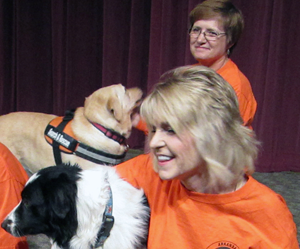
A. Well, the short answer is that the dogs provide us with a capability that currently does not exist in medicine. With their amazing sensory abilities, their training potential, and their unique relationship with humans, dogs can provide the medical community with an unprecedented skill set.
I, along with my endocrinologist colleague, Dr. Don Bodenner, am investigating the detection of thyroid cancer in saliva, blood, or urine of metastatic (malignant) thyroid cancer patients. It is important to realize that current screening methods often have a hard time differentiating benign (not cancerous) from malignant (cancerous) nodules (lumps).
With current diagnostic methods, 20 to 40% of thyroid biopsies will not return a diagnosis after the patient is first biopsied. As a result, multiple biopsy procedures are required, each entailing the same probability of incomplete diagnosis. As a general rule, if a patient is not diagnosed after 3 biopsy attempts, they are then referred for surgical procedure. Of those patients who have been biopsied 3 times without nodule type confirmation, 80% will receive unnecessary surgery.
In other words, 80% of those with indeterminate biopsies who undergo thyroid removal surgery DID NOT require surgery. Imagine the time, expense, pain, and anxiety associated with all these procedures only to finally realize the lump in your throat was not cancer after all.
Now imagine if the dogs could tell you at the very beginning of your clinical treatment whether or not your lump was cancerous. This would greatly assist your doctor in determining the proper course of your clinical treatment and eventual cure. Further, the total time from diagnosis to cure would be dramatically shortened.
We have already demonstrated that the dogs can detect metastatic cancer in patient urine or blood with greater than 97% accuracy. Currently, we are determining if the dogs' examination upon patient presentation is predictive of the patients' clinical outcomes. These studies will help us determine their capability for early disease detection. If these studies have the anticipated results, it is then our intent to perform larger scale trials to validate their utilization in clinical practice and diagnosis.
Arny A. Ferrando, PhD
Professor, Geriatrics
Center for Translational Research in Aging and Longevity


 RSS Feed
RSS Feed